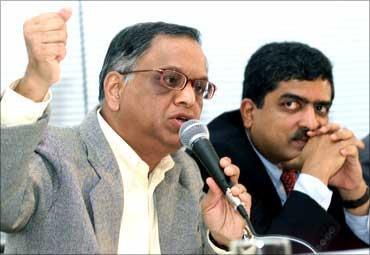
The brand is rarely seen in the mass media, makes do with minimal advertising budgets, operates in a sector that runs the risk of turning into a commodity and is still worth almost Rs 37,000 crore (Rs 370 billion).
Infosys is a powerful brand in the world of information technology. Its founders like NR Narayana Murthy and Nandan Nilekani enjoy iconic status in the country and abroad, and it gets work place, transparency and governance awards with unfailing regularity. Its campuses are world class. A large chunk of its stock is held by employees.
That's the public face - what investors, associates, analysts and employees get to see.
Behind the scenes, there works a dedicated team that regularly monitors Infosys' brand health and makes sure that it grows from strength to strength.
The tools employed are soft in nature and seek to create a halo around the brand. No big bucks spent below the line, no media blitzkrieg - the whole effort is to work on the conscience of stakeholders like customers, partners, shareholders, employees and the society.
"Infosys 1.0 raised the standard for delivery predictability, financial transparency and corporate governance," says Infosys Technologies' head of global branding and corporate marketing, Aditya Nath Jha. "The next stop is talent management, scalability and sustainability - how do I paint the enterprise of tomorrow."
...
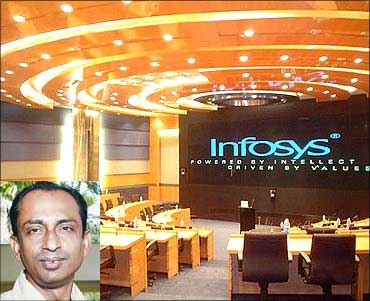
Jha's choice as the brand manager is interesting. He studied at the Indian Institute of Technology, Kharagpur, and worked as the creative head of Ogilvy.
He wrote the script for two soap operas - Aflatoon and Wagle Ki Duniya II - and ran a start-up in the education vertical ("The model worked, the business failed," says he.) before he took up the current assignment at Infosys.
Since end-2004, the Bangalore-headquartered company gets a quarterly health check up of its brand done. According to Jha, Infosys' unaided brand recall in the US (the largest market for information technology in the world) has improved from zero then to 8 per cent in March 2010, while the aided recall has shot up from 18 per cent to 70 per cent.
The survey, carried out by Ronin, is conducted not amongst CTOs but amongst ordinary people. Jha, of course, is ...

Jha says that there are two noticeable shifts between end-2004 and now: One, fewer people now say don't know. This means that more and more people now have some perception of Infosys.
And two, there is an improvement in the number of people with a positive perception. But this is a gradual process. Jha admits that movement in perception is sluggish when compared to awareness.
Brand pull
One question that needs to be answered here is that why does an information technology company need to develop a brand? The brand comes handy in two ways. One, it shortens the journey to the bidding table. Companies that have a strong brand are more likely to be called by prospective customers than those with lesser brands.
Those companies thus need to spend a lot of money on marketing themselves. This game, Infosys knows, is a bottomless pit. Big names in the business like IBM, Accenture and Hewlett Packard have marketing budgets that run into hundreds of millions of dollars.
Then there are others like Capgemini and Logica which spend tens of millions of dollars. Infosys, which has always been sharply focused on the bottom-line of its business, cannot match these numbers. So, it has no option but to work on its brand.
Infosys monitors all unsolicited invitation to deals in excess of $8 million per annum. Jha does not share the details as it is sensitive information but discloses that the increase from 2005-06 to now has been well over eight times.
Two, a brand helps get repeat business from the same customer. The business logic here is that getting a new customer on board is up to six times more expensive than getting an order from an existing customer. It is important for information technology companies like Infosys to leverage its customers for another reason.
...
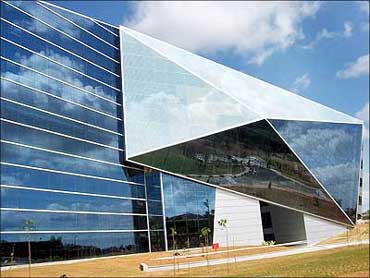
Most customers start by outsourcing peripheral work. Those who stay with a customer one day graduate from low-value peripheral jobs to value-added core work.
"Between 92 per cent and 97 per cent of our revenue in any quarter comes from repeat business," Jha informs with quiet pride.
The traditional role of a brand has been to fetch a premium over rivals. Does its brand help Infosys command a better price than others in the market place? Jha says it does, and this gets reflected in the company's superior net profit margins (27.55 per cent for 2009-10) than rivals like TCS (23.62 per cent) and Wipro (17 per cent).
"Brand-building is a key part of Infosys' strategy, and I think it is able to command a price premium because of this. The tools it has used well are public relations, investor relations, analyst relations and, in the past few years, thought leadership," says ex-Infosys hand and former Wipro chief marketing officer Jessie Paul who is now the managing director of Paul Writer Strategic Services, a marketing consultancy. Paul calls Infosys a "surround" brand which relies on the surround aspects of its business to position itself.
Still, Jha knows that brand premiums are down across categories including information technology as the search for value has intensified amongst customers. Much of what information technology companies like Infosys do is standardised.
In the initial years, Infosys tried to create a differentiator with its global delivery model - it promised to go to any location where the costs were the lowest, which invariably was India. But others have caught up.
Even foreign-owned companies like IBM and Accenture have a huge presence in the country. Now, Infosys feels, the differentiator for the brand could lay in how it behaves. This has, in fact, become a global trend.
...
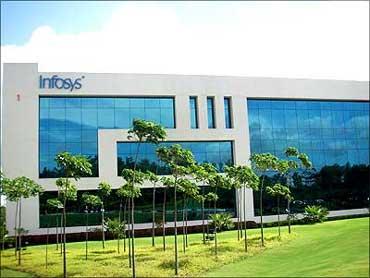
Companies like Microsoft, Google and even Toyota and Samsung are bigger brands than their individual products.
Since the health of the parent brand has occupied centrestage, it is important for companies to nurture their brand image with care.
In Infosys' case, this perhaps also stems from the firm belief of the founders of the company that they will chase not revenue or profit but respect.
To this end, the points of action identified by Infosys are: Integrity & transparency, fairness (prejudices of the past should not affect business decisions), leadership by example, customer delight and pursuit of excellence. Infosys has got several awards for integrity and transparency.
Recently, it was voted the "best managed company" in India by investors and analysts across Asia in a poll conducted by Finance Asia , a financial magazine. IR Global Rankings and MZ Consult ranked it amongst the best companies in Asia-Pacific and China in the categories of investor relations website, financial disclosure procedures and corporate governance practices.
For ten years in a row, The Wall Street Journal has named it the most admired Indian company. What about customer delight and pursuit of excellence? How do Jha and his team measure it? "Our number of defects per kiloline of code," says Jha "is way below the published benchmark of CMM Level 5 companies."
...
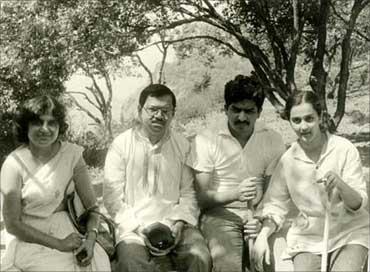
Communicate to engage
This is not to say that Infosys does not communicate. But it is different, says Jha, from mainline brand communication.
"We have moved from information to engagement. The new media is all about conversation." Thus, the Infosys brass can be found at the World Economic Forum talking to business leaders from across the world.
The company has also sought to engage with opinion makers on the subject of "the flat world" - a take on the book of a similar name by Thomas Friedman who was inspired by his long conversations with Nilekani.
So, what's the impact? Jha reels off a string of numbers: Subscribers of Infosys blogs from the Fortune 500 companies have more than doubled in the last two years, while their downloads from the Infosys website have increased 68 per cent.
Between April 2010 and April 2009, YouTube (it has populated the video-sharing website with short films and interviews of its leaders) viewership has gone up 1.6 times, slideshare downloads 2.8 times and Twitter followership 12 times.
Also, says Jha, there has been an increase in the ranks of evangelists who talk positively about the Infosys brand and recommend it to others. These could be customers, public speakers, analysts or even journalists.
...
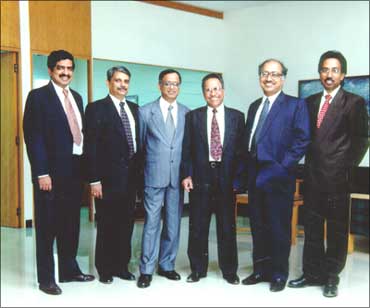
Most analysts believe Infosys has made all the right moves.
"Infosys wants to make its brand visible in the market. And it has improved because that is the way the company pitches itself," says Punish Mishra, engagement director at consulting firm Everest Group.
But some feel there is still an unfinished agenda - it needs to do more in terms of succession planning.
"The perception is that the succession line is not clearly demarcated and the new CEO may not be of the same public stature as the old ones," says an analyst who is not willing to be named.
Still others point out that branding is a game most information technology companies have woken up to. "Most of these companies now are a brand persona in themselves. For instance, Cognizant is a deep-rooted company with offerings from consulting to maintenance, while TCS is one that brings big deals, size, scale and pricing on the table. So, branding has gone up for the industry has a whole," notes Alok Shende, principal analyst, Ascentius Consulting.
At the moment, the exercise seems to have paid off for Infosys. The valuation of Infosys, the brand, has improved from Rs 14,153 crore (Rs 141.53 billion) in 2005 to Rs 36,907 crore (Rs 369.07 billion) in 2010.
It was 23.2 per cent of the company's market capitalisation five years ago; it stands at 24.6 per cent now. Jha and his team can take some credit for that.